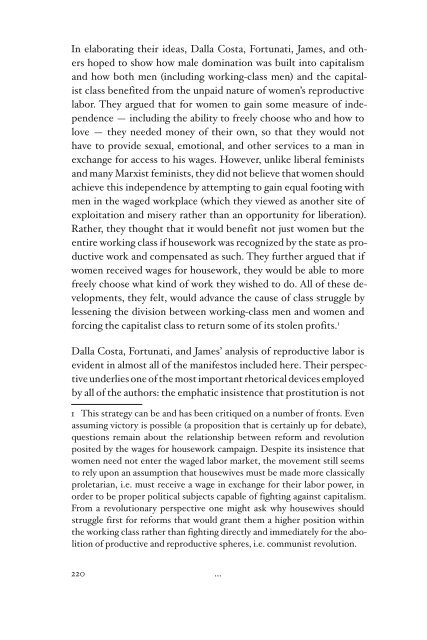Lies: A Journal of Materialist Feminism - Libcom
Lies: A Journal of Materialist Feminism - Libcom
Lies: A Journal of Materialist Feminism - Libcom
You also want an ePaper? Increase the reach of your titles
YUMPU automatically turns print PDFs into web optimized ePapers that Google loves.
In elaborating their ideas, Dalla Costa, Fortunati, James, and others<br />
hoped to show how male domination was built into capitalism<br />
and how both men (including working-class men) and the capitalist<br />
class benefited from the unpaid nature <strong>of</strong> women’s reproductive<br />
labor. They argued that for women to gain some measure <strong>of</strong> independence<br />
— including the ability to freely choose who and how to<br />
love — they needed money <strong>of</strong> their own, so that they would not<br />
have to provide sexual, emotional, and other services to a man in<br />
exchange for access to his wages. However, unlike liberal feminists<br />
and many Marxist feminists, they did not believe that women should<br />
achieve this independence by attempting to gain equal footing with<br />
men in the waged workplace (which they viewed as another site <strong>of</strong><br />
exploitation and misery rather than an opportunity for liberation).<br />
Rather, they thought that it would benefit not just women but the<br />
entire working class if housework was recognized by the state as productive<br />
work and compensated as such. They further argued that if<br />
women received wages for housework, they would be able to more<br />
freely choose what kind <strong>of</strong> work they wished to do. All <strong>of</strong> these developments,<br />
they felt, would advance the cause <strong>of</strong> class struggle by<br />
lessening the division between working-class men and women and<br />
forcing the capitalist class to return some <strong>of</strong> its stolen pr<strong>of</strong>its. 1<br />
Dalla Costa, Fortunati, and James’ analysis <strong>of</strong> reproductive labor is<br />
evident in almost all <strong>of</strong> the manifestos included here. Their perspective<br />
underlies one <strong>of</strong> the most important rhetorical devices employed<br />
by all <strong>of</strong> the authors: the emphatic insistence that prostitution is not<br />
1 This strategy can be and has been critiqued on a number <strong>of</strong> fronts. Even<br />
assuming victory is possible (a proposition that is certainly up for debate),<br />
questions remain about the relationship between reform and revolution<br />
posited by the wages for housework campaign. Despite its insistence that<br />
women need not enter the waged labor market, the movement still seems<br />
to rely upon an assumption that housewives must be made more classically<br />
proletarian, i.e. must receive a wage in exchange for their labor power, in<br />
order to be proper political subjects capable <strong>of</strong> fighting against capitalism.<br />
From a revolutionary perspective one might ask why housewives should<br />
struggle first for reforms that would grant them a higher position within<br />
the working class rather than fighting directly and immediately for the abolition<br />
<strong>of</strong> productive and reproductive spheres, i.e. communist revolution.<br />
220<br />
...

















